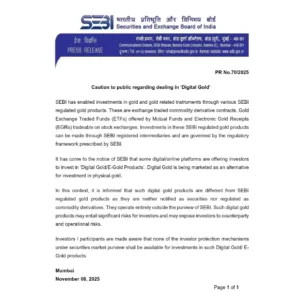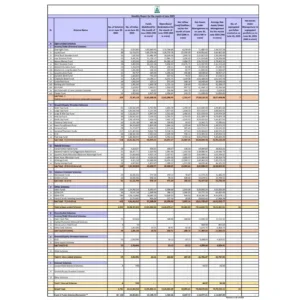Starting October 1, 2024, several new income tax rules will come into effect, affecting everything from mutual funds to insurance payouts, government bonds, and futures and options (F&O) trading. These changes, announced in the Union Budget 2024, aim to make the tax system more streamlined and efficient. Below is a breakdown of the key changes that taxpayers and investors should be aware of.
1. Introduction of TDS on Government Bonds
From October 1, 2024, a 10% Tax Deducted at Source (TDS) will be applied to interest income earned from specified central and state government bonds. This includes popular bonds such as the Floating Rate Savings Bond.
Previously, such government bonds were exempt from TDS. However, to bring them in line with other financial instruments, the government introduced this new rule. Investors holding these bonds will now see TDS deducted from their interest payouts, which will reduce the post-tax returns.
2. Increase in Securities Transaction Tax (STT) on F&O Trades
Futures and options (F&O) trading will become more expensive starting October 1, 2024, as the government has increased the Securities Transaction Tax (STT) on these transactions. This move is aimed at curbing speculative trading in the booming derivatives market.
Options Trading: The STT on the sale of options will rise from 0.0625% to 0.1% of the premium. For example, if you sell an option with a premium of ₹100, you will now pay ₹0.10 as STT, compared to the previous ₹0.0625.
Futures Trading: The STT on the sale of futures will increase from 0.0125% to 0.02% of the trade value. So, if you sell a future contract worth ₹1 lakh, the STT will increase to ₹20 from the previous ₹12.50.
3. Reduction in TDS on Life Insurance Payouts
Good news for life insurance policyholders! The TDS on life insurance payouts will be reduced from 5% to 2%, effective October 1, 2024. This applies to all life insurance claims, including maturity amounts. The reduced TDS rate will allow policyholders to retain more of their insurance payouts, providing financial relief during claims.
4. Lower TDS on House Rent PaymentsIndividuals paying rent of more than ₹50,000 per month will see a reduction in the TDS rate from 5% to 2%, effective October 1, 2024. This change falls under Section 194-IB, which governs TDS on rent payments made by individuals or Hindu Undivided Families (HUFs).
Individuals paying rent of more than ₹50,000 per month will see a reduction in the TDS rate from 5% to 2%, effective October 1, 2024. This change falls under Section 194-IB, which governs TDS on rent payments made by individuals or Hindu Undivided Families (HUFs).
This reduction is expected to benefit those paying high rents by leaving them with more disposable income after tax deductions.
5. Withdrawal of 20% TDS on Mutual Fund Repurchases
One of the most significant changes is the removal of the 20% TDS on the repurchase of mutual fund units. Under Section 194F, investors were required to pay a 20% TDS when redeeming their mutual fund units. This rule will be scrapped starting October 1, 2024, allowing investors to repurchase or redeem mutual fund units without worrying about hefty tax deductions.
6. Buybacks Now Taxable at the Shareholder Level
From October 1, 2024, share buybacks will be taxed at the shareholder level, similar to how dividends are taxed. This means that investors participating in buybacks will need to account for capital gains tax, with the acquisition cost of the shares factored into the tax calculations.
This change shifts the tax burden directly to shareholders, who will now be taxed on the capital gains from the buyback, as opposed to the previous system where companies bore the tax liability.
7. Aadhaar Enrolment ID No Longer Valid for PAN Applications and ITR Filing
Starting October 1, 2024, individuals will no longer be able to use their Aadhaar enrolment ID for applying for a Permanent Account Number (PAN) or for filing income tax returns. This rule ensures that only those with a completed Aadhaar registration can apply for a PAN or file their ITR, improving the accuracy and authenticity of the process.
Conclusion
These upcoming changes in income tax rules starting October 1, 2024, will have a significant impact on taxpayers and investors. The introduction of TDS on government bonds, changes in STT for F&O trading, and new taxation rules on share buybacks are some of the key areas to watch out for. Investors, particularly those involved in derivatives, government bonds, or mutual funds, should take note of these updates to better plan their investments and taxes going forward.
Bringing you the latest updates on finance, economies, stocks, bonds, and more. Stay informed with timely insights.





































Be First to Comment